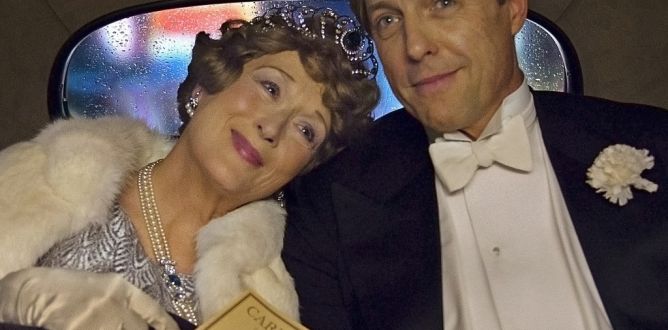Florence Foster Jenkins Parent Guide
Meryl Streep's fine depiction of the real tone deaf singer from the 1940s is funny, thoughtful and explores why flattery isn't always kind.
Parent Movie Review
Have you ever found yourself in a situation where it seemed wise to compliment someone’s abilities, even though you know they really aren’t as talented as you are leading them to believe? Such is the case for the friends and associates of Florence Foster Jenkins (played by Meryl Streep). A passionate music lover from an early age, the wealthy heiress uses her family’s fortune to establish a private theater in New York City and become a patron of the arts. But her true longing is to perform.
The movie opens at the Verdi Club, where Florence literally flies above her guests, suspended from a harness while portraying a rather unconventional angel. In the audience are the many socialites who patronize the establishment and are appreciative of the talent her venue and loose purse strings attract. Yet it soon becomes obvious that the eccentric woman has the enthusiasm of a child caged within a body that isn’t able to keep up. Standing by her side is St Clair Bayfield (Hugh Grant), her husband and B-rate actor, who gently guides and keeps watch of her much like someone balancing an antique statue on a three-legged table.
When Florence attends a concert by Lily Pons in Carnegie Hall, it reignites her former desire to sing on stage. From years of experience, Mr. Bayfield knows that resistance to her ideas is a waste of time. So he rehires the esteemed Metropolitan Opera conductor Carlo Edwards (David Haig) to be Florence’s vocal coach. However, a new pianist is required. The auditions produce Cosme McMoon (Simon Helberg in a scene stealing performance), a brilliant player who is desperately waiting for his big break. The paycheck alone has him excited, but when he discovers he’s working with Carlo Edwards, his face immediately reveals his anticipation of having been selected for something amazing.
Then Florence opens her mouth…
In what is be one of the funniest movie scenes of the year, we watch St Clair and Carlo, much like the weavers of The Emperor’s New Clothes, patronize their student and implore her to continue practicing while assuring her she has never sounded better. Meanwhile Cosme, doing everything he can to keep his look of utter disbelief under control and not break out into hysterical laughter, focuses all his efforts on playing the classical piece.
It is at this point that we begin to understand the complexities of Florence’s public and private life. A kind and generous woman, she has offered performance and social opportunities to many. She is the financial facilitator to a grand party of benefactors and artistic hopefuls. And now she wants her own moment in the spotlight. How can those who supposedly love her, deny her this opportunity?
Further examination into St Clair’s relationship with the opera wannabe explain how he has fallen into this quandary. The aspiring thespian is the second man in her life and it is implied that her monetary resources were part of his attraction. A previous health complication leaves the couple in a celibate marriage, which, in his mind, justifies keeping a long term mistress (Rebecca Ferguson) in his personal apartment. However, there is still strong evidence to support the notion that St Clair is devoted to Florence—at least in the way a protective father would dote on an ailing child.
Other than frequent tobacco and alcohol use, and a short moment when St Clair and his mistress are seen in bed, content concerns are relatively minor. A discussion surrounding a sexually transmitted disease and its negative implications are also included. Although few teens will be scrambling to see Meryl Streep’s fine depiction of the real tone deaf singer from the 1940s, the script does supply some interesting discussion points surrounding the ethics of unwarranted aggrandizement and the rationalization of infidelity.
At the end of the classic fairytale, a child reveals what the emperor is actually wearing, and the flattered royal admits he was suspicious all along. In this movie, the naked truth erupts from a different source. Either way, both of these stories explore the possible reasons (kindness, greed, peer pressure) that may motivate us into convincing someone they are more than what meets the ear.
Directed by Stephen Frears. Starring Rebecca Ferguson, Meryl Streep, Hugh Grant . Running time: 110 minutes. Theatrical release August 12, 2016. Updated July 17, 2017
Florence Foster Jenkins
Rating & Content Info
Why is Florence Foster Jenkins rated PG-13? Florence Foster Jenkins is rated PG-13 by the MPAA for brief suggestive material.
Violence: Stage actors wear gory make-up. References are made to WWII, and the brave sacrifices of the soldiers. Heckling and mocking occur. A character bitrates a disrespectful crowd. A brawl occurs at a bar. A man mentions being “jumped” by drunken servicemen. A medical condition causes an ugly rash, depleted energy, occasional hysterical behavior and eventually a complete collapse.
Sexual Content: Couples embrace and kiss. An extra-marital affair is depicted. Sexual relationships are implied. A naked man and women are shown in bed together, with sheets coving private body parts. A sexually transmitted disease is discussed, along with infidelity and the intimate relationship between a married couple. A man makes sexual overtures to another man. An illegitimate child is mentioned. A woman strikes some sexy poses in response to some catcalling from a group of men. Mild sexual references and innuendo are heard.
Language: Racial prejudice against Jews is mentioned. Some mild and moderate profanities are heard and terms of deity are used as expletives.
Alcohol / Drug Use: This period piece frequently depicts smoking and alcohol consumption. Several characters drink to excess and many are depicted as drunken. Characters suffering from hangovers vomit. An older man encourages a younger man to drink. Medicines are discussed in relation to treating a long-term illness.
Page last updated July 17, 2017
Florence Foster Jenkins Parents' Guide
Florence Foster Jenkins cannot sing, yet those around her protect her from that truth. Why? What do you think motivates St. Clair Bayfield to pay to keep up the façade? Do you feel he believed she would improve? How does Cosme McMoon get drawn into the charade? How about her loyal audience? When do you think their intentions are kind and loving? When might they be greedy or selfish? How do her friends benefit from flattering her passion for music?
Have you ever wondered how someone who doesn’t sing well can become a popular star? Does this ever happen today? What or who may motivate someone to keep trying to perfect an ability even when it isn’t all that unique? What techniques do we have at our disposal today to hide or cover a lack of talent?
Despite her lack of skill, Florence still became popular. Why did this happen? Was it fair to Florence? Do you think she would she have been this successful if she had intended to spoof or mock the classical music genre?
In the movie, and in real life, Florence Foster Jenkins suffered from a sexually transmitted disease, which she contracted from her unfaithful husband. (Interestingly enough, Meryl Streep plays another character caught in the same circumstances in the movie Out of Africa – also based on a true story.) How would you feel if you discovered you had a degenerative, terminal illness thanks to someone else’s poor choices? Learn more about the history of syphilis.
News About "Florence Foster Jenkins"
Learn more about the real Florence Foster Jenkins
From The Studio: In 1940s New York, Florence Foster Jenkins is the true story of the legendary New York heiress and socialite (Meryl Streep) who obsessively pursued her dream of becoming a great singer. The voice she heard in her head was beautiful, but to everyone else it was hilariously awful. Her "husband" and manager, St. Clair Bayfield (Hugh Grant), an aristocratic English actor, was determined to protect his beloved Florence from the truth. But when Florence decided to give a public concert at Carnegie Hall, St. Clair knew he faced his greatest challenge.Home Video
The most recent home video release of Florence Foster Jenkins movie is December 13, 2016. Here are some details…
Home Video Notes: Florence Foster Jenkins
Release Date: 13 December 2016
Florence Foster Jenkins releases to home video (Blu-ray + DVD + Digital HD) with the following bonus features:
- Deleted Scenes
- “Ours is a Happy World”
- The Music and Songs of Florence
- From Script to Screen
- Designing the Look
- Florence Foster Jenkins World Premiere
- Q&A with Meryl Streep
- Live at Carnegie Hall
Related home video titles:
Other dreamers who wouldn’t quit despite how impossible their aspirations appeared are depicted in Rudy and Eddie the Eagle. Director Stephen Frears also worked on The Queen and Philomena.



